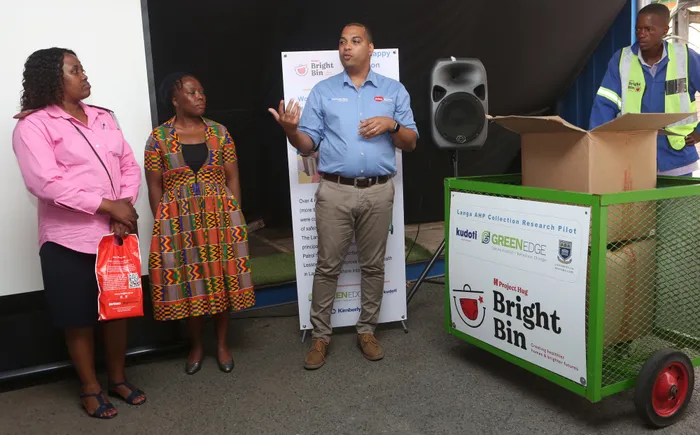Langa project aims to tackle disposable nappy waste

Second from left are Brenda Skelenga, project coordinator of Langa Bright Bin, and Mario Abrahams, sustainability manager from Kimberly-Clark. Picture: BHEKI RADEBE
A six-month research pilot project with Early Childhood Development (ECD) centres to test ways to collect dirty disposable nappies has been carried out in Langa.
The project was funded by Kimberly-Clark, makers of Huggies to trial methods to provide a dirty nappy collection service in the area.
Disposable nappies thrown onto open areas and uncollected by the municipality are a significant public health risk in townships. So are nappies disposed of in toilets which cause sewage blockages.
“We approached the ECD forum who welcomed us into the area and gave us access to the mothers in the community and they came forward as well. We are fortunate to have a welcoming and engaging community who participated to see how the project could work,” said Hugh Tyrell, founder and director of GreenEdge Communication, which was contracted to manage the research project.
Two models were tested, the first model is a drop model, where parents have to separate the waste at home, take the used nappies and drop them in the creches. The second model used trolleys that go around a sample of homes they are collecting from, so parents hand over their dirty nappies to collectors.
ECD centres were given large bins to hold the used nappies that are collected on Tuesday and Fridays. Project staff weighed the nappies. The results showed that on average close to two tons of nappies were being collected a month from 120 parents and 12 ECDs.
The nappies are then collected by private waste companies and taken to municipality landfill sites.
“The whole project was educational, by merely participating (parents) learned ways of separating waste, they learned the importance of how to manage the waste,” said Professor Catherine Schenck, chair in Waste and Society at the University of the Western Cape.
She said people used disposable nappies because of convenience. “It's something that you do not need to wash especially when you live in areas that do not have access to running water. You just use it and throw it in the bin, but that's where the problem starts. The parents said in the research that we did, that it is difficult with the cloth nappies, because they need to buy water if they don't have access to running water, they need to buy soap as well”.